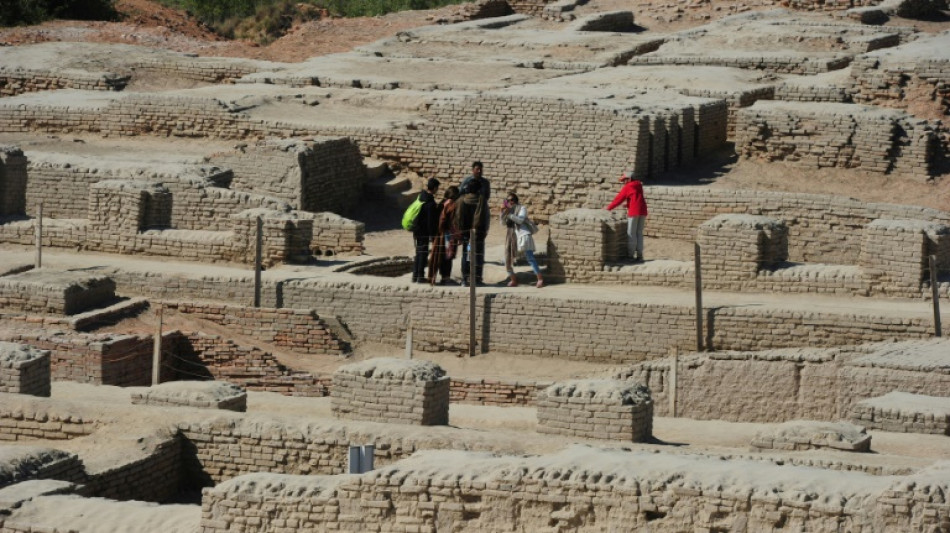
-
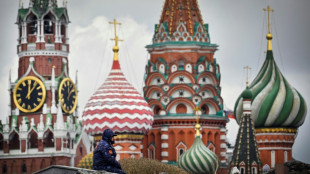 US envoy to visit Moscow as US pushes for ceasefire
US envoy to visit Moscow as US pushes for ceasefire
-
At least 24 killed in Kashmir attack on tourists: Indian police source

-
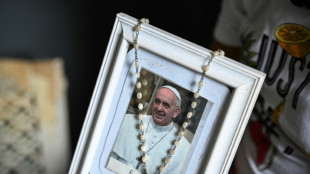 Philippine typhoon victims remember day Pope Francis brought hope
Philippine typhoon victims remember day Pope Francis brought hope
-
IMF slashes global growth outlook on impact of Trump tariffs
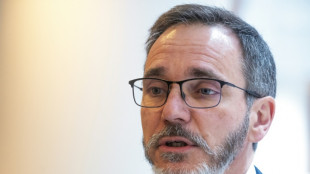
-
 BASF exits Xinjiang ventures after Uyghur abuse reports
BASF exits Xinjiang ventures after Uyghur abuse reports
-
Nordics, Lithuania plan joint purchase of combat vehicles

-
 Gold hits record, stocks diverge as Trump fuels Fed fears
Gold hits record, stocks diverge as Trump fuels Fed fears
-
World could boost growth by reducing trade doubt: IMF chief economist

-
 IMF slashes global growth outlook on impact of US tariffs
IMF slashes global growth outlook on impact of US tariffs
-
IMF slashes China growth forecasts as trade war deepens
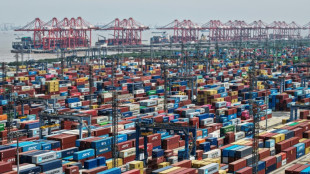
-
 Skipper Shanto leads Bangladesh fightback in Zimbabwe Test
Skipper Shanto leads Bangladesh fightback in Zimbabwe Test
-
US VP Vance says 'progress' in India trade talks

-
 Ex-England star Youngs to retire from rugby
Ex-England star Youngs to retire from rugby
-
Black Ferns star Woodman-Wickliffe returning for World Cup

-
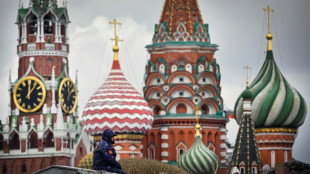 Kremlin warns against rushing Ukraine talks
Kremlin warns against rushing Ukraine talks
-
Mbappe aiming for Copa del Rey final return: Ancelotti

-
 US universities issue letter condemning Trump's 'political interference'
US universities issue letter condemning Trump's 'political interference'
-
Pope Francis's unfulfilled wish: declaring PNG's first saint

-
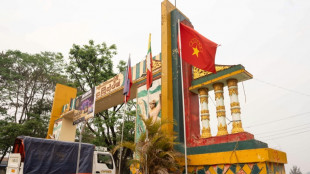 Myanmar rebels prepare to hand key city back to junta, China says
Myanmar rebels prepare to hand key city back to junta, China says
-
Hamas team heads to Cairo for Gaza talks as Israel strikes kill 26
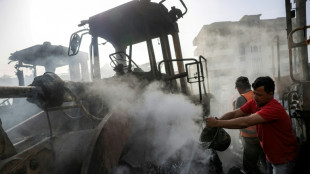
-
 Pianist to perform London musical marathon
Pianist to perform London musical marathon
-
India's Bumrah, Mandhana win top Wisden cricket awards

-
 Zurab Tsereteli, whose monumental works won over Russian elites, dies aged 91
Zurab Tsereteli, whose monumental works won over Russian elites, dies aged 91
-
Roche says will invest $50 bn in US, as tariff war uncertainty swells
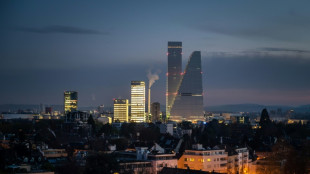
-
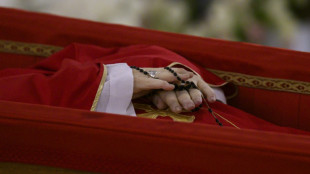 Pope Francis's funeral set for Saturday, world leaders expected
Pope Francis's funeral set for Saturday, world leaders expected
-
US official asserts Trump's agenda in tariff-hit Southeast Asia
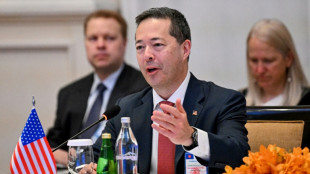
-
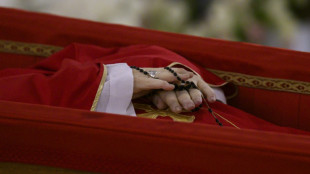 World leaders set to attend Francis's funeral as cardinals gather
World leaders set to attend Francis's funeral as cardinals gather
-
Gold hits record, stocks mixed as Trump fuels Fed fears

-
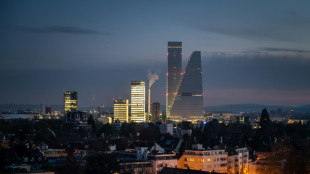 Roche says will invest $50 bn in US over next five years
Roche says will invest $50 bn in US over next five years
-
Fleeing Pakistan, Afghans rebuild from nothing
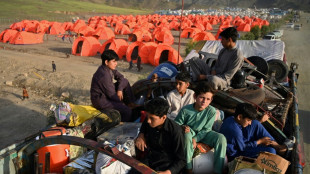
-
 US Supreme Court to hear case against LGBTQ books in schools
US Supreme Court to hear case against LGBTQ books in schools
-
Pistons snap NBA playoff skid, vintage Leonard leads Clippers

-
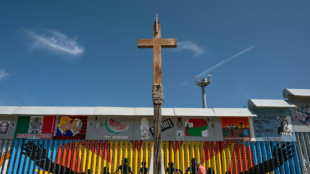 Migrants mourn pope who fought for their rights
Migrants mourn pope who fought for their rights
-
Duplantis kicks off Diamond League amid Johnson-led changing landscape

-
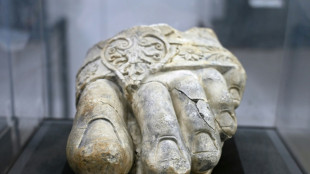 Taliban change tune towards Afghan heritage sites
Taliban change tune towards Afghan heritage sites
-
Kosovo's 'hidden Catholics' baptised as Pope Francis mourned
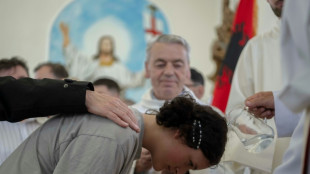
-
 Global warming is a security threat and armies must adapt: experts
Global warming is a security threat and armies must adapt: experts
-
Can Europe's richest family turn Paris into a city of football rivals?

-
 Climate campaigners praise a cool pope
Climate campaigners praise a cool pope
-
As world mourns, cardinals prepare pope's funeral
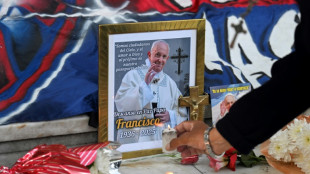
-
 US to impose new duties on solar imports from Southeast Asia
US to impose new duties on solar imports from Southeast Asia
-
Draft NZ law seeks 'biological' definition of man, woman
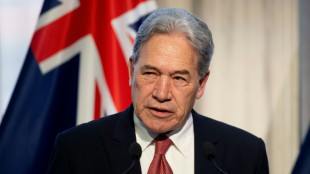
-
 Auto Shanghai to showcase electric competition at sector's new frontier
Auto Shanghai to showcase electric competition at sector's new frontier
-
Tentative tree planting 'decades overdue' in sweltering Athens

-
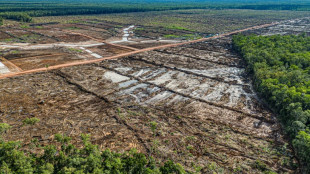 Indonesia food plan risks 'world's largest' deforestation
Indonesia food plan risks 'world's largest' deforestation
-
Gold hits record, stocks slip as Trump fuels Fed fears

-
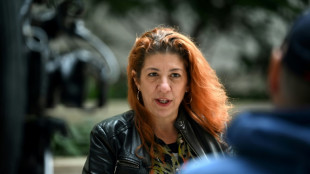 Trump helps enflame anti-LGBTQ feeling from Hungary to Romania
Trump helps enflame anti-LGBTQ feeling from Hungary to Romania
-
Woe is the pinata, a casualty of Trump trade war

-
 'Like orphans': Argentina mourns loss of papal son
'Like orphans': Argentina mourns loss of papal son
-
Trump tariffs torch chances of meeting with China's Xi


Climate change 'main threat' for world heritage sites
One of the world's first cities came close to being wiped off the map during tragic floods this summer in Pakistan. Though Mohenjo Daro survived, it has become a symbol of the threat global warming poses to humanity's cultural heritage.
Built in around 3000 BC by the Indus civilisation in modern-day South Asia, Mohenjo Daro was not swept away by the floods, most likely thanks to the genius of its designers.
Perched high above the Indus river, the city was equipped with a primitive drainage system and sewers, meaning much of the floodwaters could be evacuated.
Nearly 1,600 Pakistanis died in the floods and 33 million others were affected in a disaster "probably" made worse by global warming, according to World Weather Attribution, a network of researchers.
The ancient metropolis "could have disappeared with all the archaeological traces" it contains, said Lazare Eloundou Assamo, the director of the World Heritage programme at UN agency UNESCO.
The Pakistani site was "a victim" of climate change and was "very lucky" to still be around, exactly 100 years since it was first discovered in 1922, Assamo said.
Fortunately, "the situation is not catastrophic" in Mohenjo Daro, said Thierry Joffroy, a specialist in brick architecture who visited the site on behalf of UNESCO.
Despite ground sinking in some areas and water damage to some structures, the site "can be repaired," Joffroy said.
- 'Huge impact' -
For 50 years, Paris-based UNESCO has compiled a list of World Heritage sites, significant places that are deemed worthy of protection, and is marking the milestone this week in Greece.
"To protect this heritage ourselves... is to confront the consequences of climate disruption and the loss of biodiversity. It's the main threat... that we assess in a tangible way," UNESCO director Audrey Azoulay told the conference in Delphi on Thursday.
Of its 1,154 World Heritage sites, "one site in five, and more than a third of natural sites, already see this threat as a reality," she said.
"We are experiencing many more incidents of floods, hurricanes, cyclones, typhoons," said Rohit Jigyasu of the International Center for the Study of the Conservation and Restoration of Cultural Property (ICCROM).
"We have these climate-related disasters, which are having a huge impact on sites, for example Mohenjo Daro," he said.
Huge forest fires have scorched the Rocky Mountains in Canada, which are a world heritage site, and this year flames came within 15 kilometres (nine miles) of Delphi as heatwave intensify the severity of wildfires across the Mediterranean basin.
In Peru, meanwhile, landslides occurred this year at the foot of Machu Picchu in the Andes mountains.
Other less noticeable changes can also have serious consequences.
In Australia, the protected Great Barrier Reef is experiencing bleaching episodes due to rising water temperatures.
In Ghana, erosion has washed away part of Fort Prinzenstein, which is conserved as a notable slave trading post.
- Termites and drought -
"Slow factors" that do not have an immediate impact pose "new kinds of risks in many of these sites," Jigyasu said.
These include invasions of wood-eating termites in areas that were previously either too dry or too cold for the insects to thrive.
In other countries, the drying out of soil due to declining rainfall can have a "destabilising" effect on some heritage sites, said Aline Magnien, director of the French state-funded Laboratory for Research on Historical Monuments.
Under drought conditions, "the soils contract and... make the foundations move", then "swell suddenly when it rains", which causes cracking, she said.
When parched and hard, they absorb less water, which promotes flooding.
"We may have certain heritage sites that we will not be able to save, that we will not be able to transmit, which will perhaps be doomed to disappear", said Ann Bourges, a researcher from the French culture ministry.
"It's not just the heritage that is affected when you lose part of it, but all the social system around it," added Bourges, who is also secretary general of the International Council of Monuments and Sites (Icomos), an NGO.
In Mongolia, archaeological sites have been abandoned then looted because "the population no longer had access to water", Jigyasu added.
Expected water shortages in the future could also lead to an increase of conflicts in which important heritage sites might be lost.
A.Gasser--BTB



